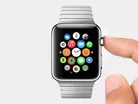[VIDEO] Apple Watch: Beneficial for Health Care Providers or Overhyped?

Apple’s unveiling of its eagerly-anticipated iPhone 6 and Apple Watch on Tuesday was successful overall but disappointing to those who work in health care.
While interest has been drawn from major healthcare players such as Mayo Clinic and Beth Israel Deaconess Medical Center, others are less than impressed, calling it just another smartwatch.
“The Apple Watch is designed to help anyone who wears it lead a healthier life by being more active,” said Jay Blahnik, Director of Fitness at Health Technologies.
Apple CEO Tim Cook calls the watch a comprehensive health and fitness device, “the most personal device we’ve ever created.” The device is able to collect health data and share it with providers through the HealthKit app. It will be able to read information like pulse rate, time of exercise, and distance. Although earlier predictions stated that the watch would be able to track additional data such as blood pressure, temperature and hydration levels.
Ryan Kalember, chief product officer at WatchDox, told mHealth News that healthcare organizations will “take advantage of the Apple Watch’s advanced health tracking and monitoring capabilities” but Greg Carissi, Frost Sullivan’s senior vice president of health and life sciences, argued that smartwatches won’t help solve the underlying problems facing the healthcare industry.
Stating that the Apple Watch may be initially appealing, Carissi said it ultimately won’t lower healthcare costs due to the “challenges to address in leveraging the growth in mobile health technology and applications to deliver on the promise of a real change in health outcomes and costs in the U.S.”
Still, there is still enthusiasm about Apple Watch’s potential to improve health care.
The CIO of Beth Israel Deaconess Medical Center, John Halamka, said the device will be an important tool in helping healthcare providers move towards managing population health. According to Halamka, the product could “radically change” the ability to coordinate care.
According to Modern Healthcare, a report from Pew Research in January 2013 found that approximately 70 percent of Americans already track at least one health condition, so seeing consumers use Apple Watch to track their health and send their compiled data to providers isn’t too ambitious, especially for a company like Apple.



